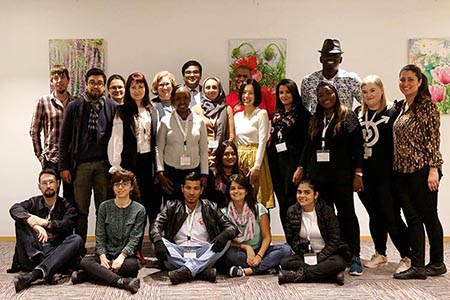Since the onset of the COVID-19 pandemic, young people have seen their income, work, education, training and work-based learning, mental health and well-being severely affected by the socio-economic consequences of the crisis.
Globally, millions of young workers, in particular young women, have lost jobs and income as they are heavily concentrated in sectors and occupations – such as retail, hospitality, leisure, and tourism – that have been the hardest hit by COVID-19 shutdowns.
Even before the pandemic, young people’s work was characterised by insecurity, low wages, inadequate or no access to social protection and no access to a trade union. The majority of the world’s young people were in the informal economy and young women were more likely than young men to be in insecure, low-paying jobs.
The pandemic has simply exacerbated the pre-existing challenges they faced. Compared with older workers, young workers are more than twice as likely to have lost their jobs during the pandemic while those who still have a job have seen their working conditions deteriorate. Young people who were about to enter the labour market as the pandemic hit have been left with few employment options.
For young people who are more exposed to exploitation and abuse due to intersecting discrimination based on age, gender, disability and migrant status, the pandemic has taken an even greater toll.
There are fears that the pandemic will leave a lasting mark on the most vulnerable people in the world of work, and in society at large. Coupled with the devastating impacts of climate change, young people’s future looks uncertain unless urgent and bold action is taken.
Young people agree : system change is necessary. A New Social Contract can help prevent the exclusion of a generation of young people and can build a resilient future for them grounded on social and economic justice for all.
On 12 August 2021, International Youth Day, young workers and trade unions in alliance with youth-led organisations and social justice movements across the world will be joining their voices calling for a New Social Contract shaped by 5 key demands :
- Rights : guarantee labour rights and protections for all young workers, including the right to join a union and access to training opportunities and life-long learning ;
- Jobs : invest in climate-friendly jobs along with jobs in health, care, education and other quality public services ;
- Social protection : secure social protection for all workers, including young and informal economy workers, and establish a Global Social Protection Fund ;
- Equality : ensure the equal and equitable participation of young people and equity-seeking groups in economic, social, political and cultural life ; and
- Inclusion : dismantle intersecting systems of oppression that exclude people based on gender, race, class, nationality, citizenship, disability, age, sexual orientation or gender identity.



